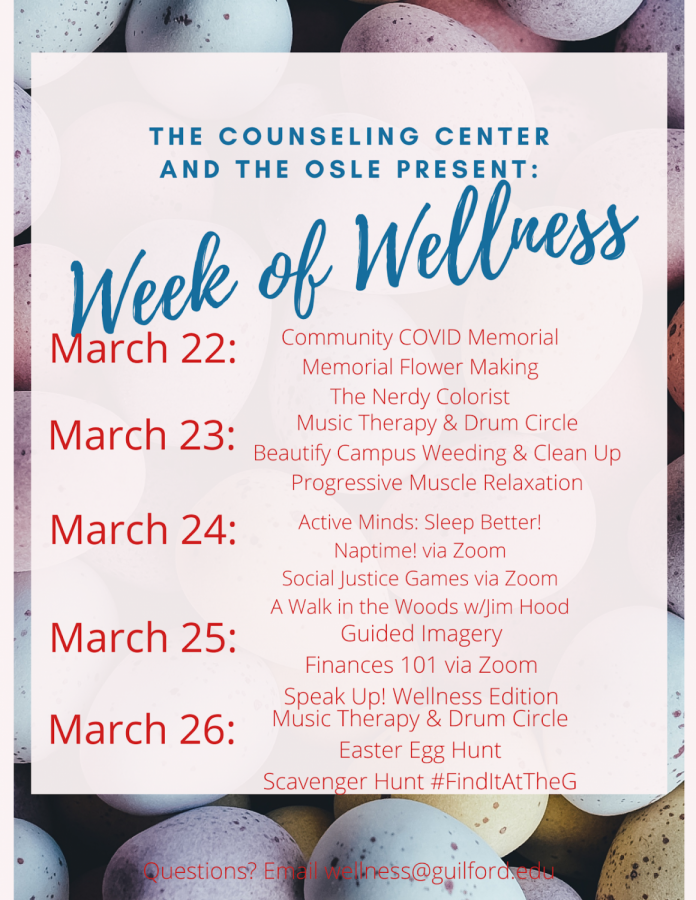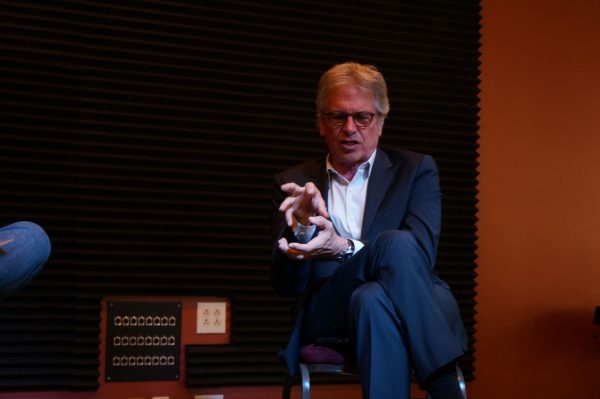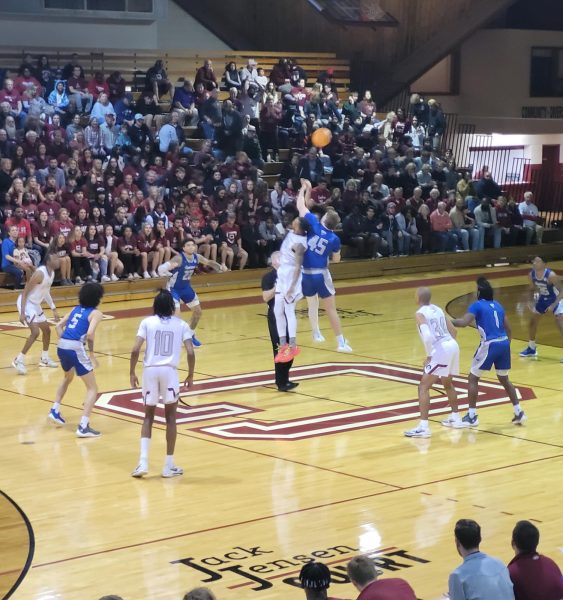Working for wellness: Putting wellness days on Guilford’s radar
Guilford College Counseling Center
The Week of Wellness Schedule that was sent out to students.
“It’s never too late for mental health,” said sophomore psychology major Tinyah Ervin. “Pandemic or no pandemic, it’s important to have time off from school.”
With Guilford College canceling spring break to minimize opportunities for travel during the pandemic, many students are feeling overwhelmed and burnt out as the semester drags on. This is not a uniquely Guilford experience, as many other colleges and universities across the nation have also cancelled spring break. However, many of these other universities included something in their schedules to offset the absence of spring break: wellness days.
Wellness days are rest days interspersed throughout the semester where classes and assignments are cancelled to give students a break from academia. Wellness days are a time for students to rest and relax, something very important during this tumultuous pandemic. Although wellness days weren’t common in American universities pre-pandemic, many colleges have implemented wellness days during the pandemic as an alternative to offering spring break.
At the beginning of the spring semester, Ervin realized what other colleges were doing. Howard University, UNCG, UNC Chapel Hill, Harvard University and other institutions began replacing spring break with wellness days throughout the semester to alleviate student stress and give them breaks from class.
After seeing wellness days being implemented at other schools, Ervin began questioning why nothing like that was happening at Guilford. Not even during the week of March 22—Guilford’s Week of Wellness—had the College scheduled days off for students.
“If we weren’t conditioned to have a spring break since kindergarten, it would be different,” she said, “but we’re so used to having a built in break that going straight through the semester is killing us.”
To raise awareness for wellness days and try to get them implemented at Guilford, Ervin set a plan in motion, starting a petition and creating a survey to gauge student interest in wellness days. Although Ervin originally planned to go through student services with her findings, she found a partner in the Guilford Student Body Association who was already studying student mental health on campus during this pandemic.
“It definitely wasn’t just me,” Ervin admitted readily. “If I just kept doing this by myself, I don’t think we would’ve gotten anything at all.”
In partnership with GSBA, the provost office and several faculty members, Ervin pushed forward the idea of wellness days, encouraging the Guilford community to refocus on mental health during the pandemic.
The original proposal for wellness days was to have the administration cancel class for two days during the Week of Wellness, as well as the last day of classes on April 5. Many voiced objection to this proposal—though the intent was admirable, it was far too late in the semester to cancel days when professors had already had their course schedules set for months.
A compromise was found: faculty members were highly encouraged (but not required) to give their students wellness days, especially during Week of Wellness or the last day of classes. True to the Guilford College spirit, many faculty members worked wellness days into their class schedules during the Week of Wellness.
Many Guilford students are grateful for Ervin’s efforts, as they have resulted in some faculty members cancelling classes and assignments during the Week of Wellness.
Junior football player Eric Mays was one student who benefitted from the push for wellness days. Between football and classes, his schedule is overwhelming and the absence of spring break was taking a mental and physical toll on him. He is constantly tired and low with the stream of assignments, and practices and games are seemingly never-ending.
“I didn’t realize how bad I needed spring break until I didn’t have it anymore,” Mays said. However, he was ecstatic that his professors cancelled his classes on Friday—the last day of Guilford’s Week of Wellness—and that he finally had a break in his overwhelming schedule.
“I finally feel like I have a chance to breathe,” Mays said. “I hope I never go this long without a break again.”
This year, everyone has learned the importance of mental health and taking breaks.
“I hope (the administration) begins to build wellness days into our schedules in the future,” Ervin reflected. “If this year has taught us anything, it’s that we shouldn’t take breaks for granted.”











